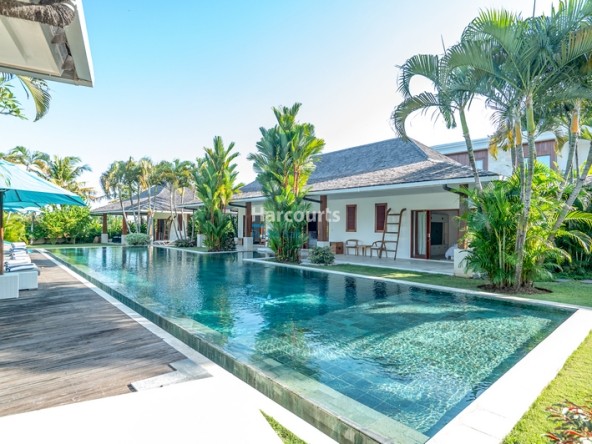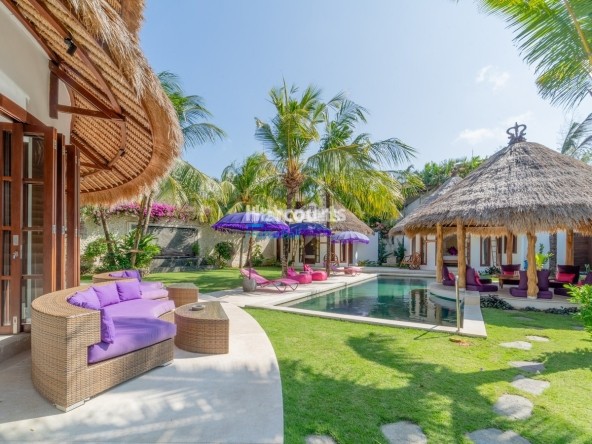JAKARTA – Indonesia is set to relax property rules soon to make it easier for foreigners to own homes in the country, a Cabinet minister said on Thursday (July 23), in a major change that could spur the slumping economy.
Thank you for reading this post, don't forget to subscribe!Agrarian and Spatial Planning Minister Sofyan Djalil told property tycoons in a webinar that the new property rules set to be ratified into law by the end of next month (August), will allow foreigners to have the same rights as Indonesian property buyers.
“On this foreign ownership matter, God willing… we will have (the Bill that covers the matter) ratified into law by end-August,” Mr Sofyan said in the Web seminar attended by the country’s top property tycoons, which was organised by the Indonesian Real Estate Developers Association (REI).
“That is the commitment from Parliament and President Joko Widodo had requested for such a timeline to be the deadline.”
Among the webinar’s participants were Mr James Riady of the Lippo Group, Mr Muktar Widjaja of the Sinar Mas Group and Mr Sugianto Kusuma of Agung Sedayu group.
The government’s plan to loosen the property rules comes amid the coronavirus pandemic that has shrunk the economy and caused massive job losses.
South-east Asia’s biggest economy was estimated to have shrunk by at least 3 per cent in the second quarter year on year, compared with a 5 per cent growth last year.
The Indonesian property sector supports at least 170 other industries from cement, steel and the creative industries such as interior decor. The sector employs more than 30 million people or about 11 per cent of the country’s population.
Foreigners are currently allowed to buy apartments, but not landed homes, in Indonesia and they only get a 30-year leasehold titles for these units, which made it tough to get bank loans.
The 30-year leasehold is extendable by another 20 years upon application. Buyers could also later apply for an additional 30-year extension to the leasehold atop the 50-year lease.
But this has posed a big stumbling block for foreign buyers and soured demand, as Indonesian law could change in between their applications.
In contrast, Indonesians who buy properties in the country generally get a freehold tenure to their homes, or leaseholds with guaranteed extensions.
Further, in many other foreign countries, such as Singapore and Malaysia, leasehold titles have terms of more than 90 years at one go.
Mr Sofyan said President Joko and the government are concerned with the current inflexible clauses of ownership and want them changed.
He said that the administration is keen to upgrade the ownership title status given to foreigners when buying homes.
But Mr Sofyan did not say if the expected amendment to the law would allow the non-Indonesians to also buy landed houses.
Responding to Mr Sofyan’s August timeline, Mr Sugianto said in the webinar: “It is the right timing if the change happens in August, because everyone is waiting for this. It would drive the property sector.”
Mr Sugianto suggested that the change should be accompanied by regulations that allow foreigners and their family to a have long stay visas or permanent residency like other countries such as Malaysia and Thailand.
“Other countries give 10-year multi-year visa for the whole family of the foreign home owners. If Indonesia gives five-year and it’s extendable, that would be good enough,” he said.
Mr Muktar suggested that foreign home buyers should be given access to financing. He said they should be allowed to pledge the title of the units they buy to a bank to get a mortgage.
“The property sector has huge multiplier effects. Foreigners buying homes in Indonesia are bringing in money. They can’t take the property to their home country,” Mr Muktar said. His comments were seen as an attempt to assuage nationalist sentiments frequently expressed in Indonesia by those opposed to foreigners being allowed to own property.
Mr Riady, meanwhile, took issue with the tax office’s recent moves to question prospective buyers of large properties. The moves have dissuaded the buyers being probed.
Indonesia has in recent years stepped up tax collections, applying a harsher law enforcement on errant tax-payers.
“We need to simplify this – the query on where-the-money-is-from part. We have had clients who were about to make a transaction and were then drilled by the tax office. They ended up cancelling the purchase,” he said.
Siti Purba – Harcourts Purba
Despite the impact of the escalating US-China trade war on the global economy, Indonesia’s focus on infrastructure, manufacturing, and services has helped the country average over 5% annual GDP growth every year over the last decade. This is among the highest growth momentums in the whole of the region. Investment in Indonesia has skyrocketed both as a result and a cause of its resurgent growth.
The country is hoping to attract money from overseas by completing major infrastructure projects. Currently, the Indonesian government focuses on investment, both public and private, to boost Indonesia’s economic expansion. In particular, investment in the nation’s infrastructure and manufacturing industry is welcomed in order to improve connectivity across the archipelago and to lessen Indonesia’s traditional dependence on raw commodity exports.
Indonesia is also focusing on increasing its number of foreign arrivals to support its economic growth policies. The reality is that Bali alone cannot accommodate millions more new tourists, and projects are therefore underway to establish 10 new tourist hubs in the archipelago, in what the Indonesian government is marketing as its ‘Ten New Bali’ project, thus providing a bridge of opportunity for individual investors.
Indeed, Bali’s economy is booming. As Indonesia’s top tourist destination, the island typically has a better infrastructure than elsewhere else in Indonesia. Yet, as Bali gets more crowded and noisy, many foreigners are choosing to live in Lombok instead and this beautiful next door neighbour is likewise becoming very desirable amongst property purchasers. In fact, one of the government’s ‘Ten New Bali’ hotspots is Lombok Mandalika, a specially designed, 1,175-hectare tourism economic zone, stretching east along the south coast of Lombok towards the popular Gerupuk surf beach.
Purchasers of property in Indonesia can expect to start seeing gains well before its real estate market becomes mainstream. However, while it is fairly simple for foreigners to start a business, it is harder to invest in Indonesian property. Indonesian Land Law is quite different to the laws that apply in most Western or developed countries. Foreigners wishing to use or purchase land for any purpose need to be aware of these differences and not assume that the legal conventions that apply in their home countries necessarily apply in Indonesia.
The archipelago presents complex property investment potentials in which there are serious downside risks, and the alleged investment benefits of properties on freehold or long lease arrangements require very careful review and due diligence. The reality is that legal certainty in Indonesia has always been rather precarious, not least in the realm of land ownership by foreigners. There are many stringent laws but secure land titles for foreigners are possible if correct procedures are observed.
Agrarian Law
Prior to September 1960, Indonesian land law encompassed an overwhelming discord of traditional Adat law, extraneous Dutch colonial laws, Western civil law, and archaic laws enacted by the Indonesian government dating back to the time of Independence in 1949. The basis of modern Indonesian land law is Law Number 5 of the 1960 Basic Agrarian Law Act, which stipulates several types of land titles applicable in Indonesia with the main rights and titles over the land being those regulated under the Indonesian Agrarian Law. The basic principles of Agrarian affairs – soil, water and resources contained within the territory of the Republic of Indonesia are owned by the Indonesian Nation and shall be for the interest and welfare of the nation and people of Indonesia.
In December 2015, to support Indonesia’s domestic economic growth and attract private foreign investors within the property sector, the government set new requirements and procedures to allow foreigners to own property. In addition, Regulation No. 29 of 2016 on Procedure for Granting, Releasing, or Transferring Land Rights over Residential Houses to Foreign Nationals in Indonesia (Regulation 29), was issued in September 2016.
Article 16 Paragraph (1) of the Agrarian Law stipulates several types of Land Titles and Rights over the land, including:
- Hak Milik — roughly equivalent to Freehold title of English common law jurisdictions
- Hak Guna Usaha — Cultivation Rights Title
- Hak Guna Bangunan — Building Rights Title
- Hak Pakai — Right to Use Title
- Hak Sewa untuk Bangunan — Right to Rent for Buildings
- Hak Membuka Tanah — Land Clearing Rights
- Memungut Hasil Hutan — Forestry Rights
- Hak Guna-air, Pemeliharaan & Penangkapan Ikan — Water Use and Fisheries Rights
- Hak Guna Ruang Angkasa — Airspace Use Rights
- Hak-hak Tanah untuk Keperluan Suci & Sosial — Land Title for Social & Religious Purposes
The three most relevant for foreign investors being the Right to Use (Hak Pakai), the Right to Build (Hak Guna Bangunan), and the Right to Own (Hak Milik).
Hak Milik
Hak Milik is a freehold title that can only be held by Indonesian citizens. This title gives you the right to use your land in any way, but you can’t capitalise on the natural resources under the land. As an owner of a Hak Milik title, you can sell the title, exchange it, or use it as a mortgage. Currently, foreigners are not able to own freehold property in their own names.
Hak Pakai
As long as the property is not part of a government subsidised housing, foreigners are allowed to invest in commercial and residential real estate or property as an investment. However, because non-Indonesians may not actually own property (Hak Milik) under Indonesian law without the help of a nominee or under a foreign investment company structure, a less risky and increasingly popular solution to the prohibition on foreign land ownership is a long-term leasehold agreement under the title of Hak Pakai (Right to Use).
Leasehold titles are granted for 25 years and can be can be renewed for a maximum period of 80 years. Prior to 2016, the maximum extension period was only 20 years, so it’s clear that Indonesia property laws are slowly moving in the right direction.
Hak Pakai can be received from a person who owns the Hak Milik. By having a Hak Pakai title, you can construct residential property on the land that is owned by the person having the Hak Milik title. Hak Pakai is one of the strongest titles and you’re allowed to sell and transfer the title to another person who’s eligible to own the title in Indonesia.
Hak Guna Bangunan
The land titles, ‘Hak Milik’ (Right to Own) and ‘Hak Guna Bangunan’ (Right to Build) are certainly more advantageous, but these are not available to foreigners on their own. Property owned by a foreigner may not be Hak Milik, but the Hak Guna Bangunan title is completely firm.
Therefore, the safest way for a foreign national to invest in property is to do it through a foreign-owned limited liability company registered in Indonesia (PT PMA), which enables the foreigner to acquire the Right to Build (Hak Guna Bangunan) License and a Freehold Title/ Right to Use (Hak Pakai).
The Duration of Right is a maximum of 80 years, with an initial duration of 50 years that can be renewed for a further 30 years. The Hak Guna Bangunan title has effectively the same strength as a freehold title as long as the company continues to exist. A foreigner or company cannot simply buy up land and then do nothing with it. Indonesian land laws are designed to prevent speculation by absentee landlords who leave land idle for years at a time.
Strata Title
The law also technically allows for foreign ownership of strata condominium titles, enabling foreigners to own an apartment or office space but not the land on which it stands. However, this is not commonly (if at all) granted in practice.
Buying land with the help of an Indonesian nominee
This is a circumvention of the Indonesian law in which you, as a foreign investor, can acquire land via a contract with a nominated national who is the titleholder – a local person who is a friend, your spouse, or any other Indonesian citizen who you can 100 percent trust. Yet, while this has been a common choice among foreigners, especially for buyers in Bali, and while the local person may have the best of intentions, it is still an investment on a shaky ground. There are obvious risks in such an arrangement and you will essentially have no legal protection for your investment.
Harcourts Purba is here to help
At Harcourts Purba, we pride ourselves in explaining the details of Indonesia’s foreign ownership laws and regulations so that you are fully engaged in the process of your investment from the outset. With our professional advice and personalised service, you can achieve your dream of property ownership in one of the world’s most desirable destinations.


